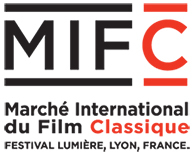Q&A Session about Africa
Hosted by RFI's former journalist, Catherine Ruelle, the roundtable "Africa: what are the new collaborative mechanisms being used to value film heritage of the continent ?" has chosen, just a few months from the 50th anniversary of Fespaco, to focus on the new impulses of the continent in terms of cinema.
But before talking about the future, it was important to do a little historical point about this African heritage. This is Tunisian filmmaker Mohammed Challouf, who, with some emotion, talked about the true emergence of African cinema following the independence in the 1960s. A militant cinema of enlightenment, telling the struggles from the point of view of the people from the continent that it is now important to restore. But from this point of view the lateness is quite important. Despite the actions of some of the film libraries that have been put in place in recent years, including that of Tangier, African heritage cinema still depend too much on the northern shores of the Mediterranean: "Although we have a lot of support from Northern institutions, we have interest in establishing cooperation. We have no structures, no technicians, film libraries are few and not very widespread. We have a lot to recover and much to do to save our archives", he says, insisting on the urgency of raising awareness among local politicians.
In the same time, filmmaker David-Pierre Fila explains that it is time to appeal to a new dynamism, launched in particular by FEPACI, the Pan-African Federation of Filmmakers, which brings together 52 states of the African continent: "We must change our way of doing cinema, adapt and encourage South / South collaborations", he announces, explaining in the mean time that we need to expand the African film market, because there is a"genuine desire for Africa " especially in an audience of afro-descendants.
In their wake, Véronique Joo Aisenberg, Head of the African Cinematheque at the French Institute, came to present the work of preservation and broadcasting of this collection of 1,700 African films from the 1960s to the present day. In its cinemas and via festivals, the French Institut is making this cinema shine through 6,000 screenings per year. A necessary work knowing that, in the 1990s, most cinemas, especially in black Africa, closed their doors.
The catalog of this African Cinematheque will also benefit from a digitization and restoration plan. By 2020, 25 films chosen by African experts and professionals will be restored and promoted as part of the Africa Institute Season 2020. Fad, jal (Grandfather, tell us) by Safi Faye (1979), released this Tuesday at the MIFC, is the first of them. Restored and digitized in 2K according to the 16mm negatives, this Senegalese feature has even benefited from a screening at the Cannes Film Festival as part of Cannes Classics.
Some elements of these African heritage works, many since the post-production was carried out north of the Mediterranean, are in Europe. According to Laurent Cormier, Head of Film Heritage management at the CNC, the aim is to return this heritage to Africa, since it is also the French government's will, but not as it is now. On the contrary, we must "make it benefit from all the digital finery that we are able to do today", always "in respect of the original work" to allow it to shine again. A point supported by Pierre Boustouller, Commercial Director Heritage pole at Eclair. But the real concern is that of conservation. Many elements have been lost or damaged and now "The main issue is to follow the path of the original negatives and soundtracks", he announces.
The other big challenge is obviously, the spreading of these films. And, without detour, the continent lacks structures. Pascal Delarue, Chief Operating Officer of Orange Studio, who for some years has accelerated his involvement in local production with films like La Pirogue or Timbuktu, wants to be part of this momentum. "In the same vein as the development of our productions in Africa, we found it interesting to participate in the restoration of the first films of each country where it was broadcast, in order to value them with respect to history. and the culture of each territory," he explains, adding in passing Orange Studio's association with the Canal Olympia circuit of the Vivendi group and the French Institute for broadcasting in an Africa particularly eager to see his own films .
Finally, three African film professionals came to bring a concrete point of view: Stéphane Vieyra of PSV Films, who is dedicated to the preservation and the spreading of the work of his father, Paulin Soumanou Vieyra, considered as the first African filmmaker, Angèle Diabang Brener, Senegalese filmmaker and producer and Thierno Ibrahima Dia, Chief editor of Africiné, a digital database listing nearly 17,000 African pieces and about to take over the reins of the Rencontres Cinématographiques de Dakar.
For all the comment is the same: there is a real lack of structure that forces them to work alone. They do not feel really supported and the most important thing for them now is to get organized. But they are rather optimistic in view of the renewed interest of the African public for its own cinema and new initiatives implemented in particular in terms of exploitation and cinematheques. It remains to convince States to invest more.



